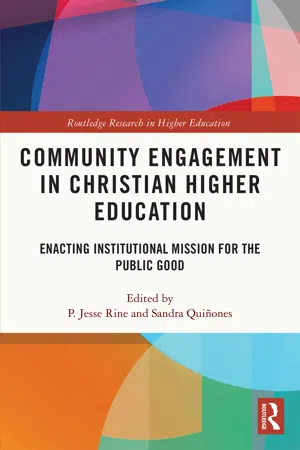
Community Engagement in Christian Higher Education
Enacting Institutional Mission for the Public Good
- 218 pages
- English
- ePUB (mobile friendly)
- Available on iOS & Android
Community Engagement in Christian Higher Education
Enacting Institutional Mission for the Public Good
About This Book
Originally published as a special issue of Christian Higher Education, this volume showcases diverse forms of community engagement work carried out by faith-based colleges and universities throughout the US.
Acknowledging the rise of community engagement as a contemporary expression of a longstanding civic impulse, Community Engagement in Christian Higher Education explores how religious mission and identity animate institutional practice across various forms of Catholic and Protestant Higher Education. Offering perspectives from faculty members, administrators, and community partners at nine different US institutions, chapters highlight effective initiatives that have been actively implemented in rural, urban, and suburban contexts to meet local needs and serve the public good. With a focus on practical community work, the text demonstrates the very concrete ways in which Christian values can inform and foster community engagement.
This volume will be of interest to scholar-practitioners, researchers, and academics in the fields of higher education, sociology of education, religious education, and practical theology. More broadly, the text offers important insights for faith leaders and the faculty of faith-based institutions exploring issues of community, identity, and shared purpose.
Frequently asked questions
Information
1Mission Animation
Christian Higher Education, the Common Good, and Community Engagement
Christian Higher Education
Professional Networks
Table of contents
- Cover
- Endorsement Page
- Half Title
- Series Page
- Title Page
- Copyright Page
- Dedication
- Table of Contents
- List of Figures
- List of Tables
- About the Contributors
- Acknowledgments
- Introduction: Doing Justice, Loving Kindness, Walking Humbly: Christian Approaches to Community Engagement
- Chapter 1: Mission Animation: Christian Higher Education, the Common Good, and Community Engagement
- Chapter 2: Re-membering the Mission: Institutional Impacts of an Interdisciplinary Community Outreach Project
- Chapter 3: Reconciling Structural and Personal Expressions of Justice in Jesuit Education
- Chapter 4: Pursuing Social Justice through Place-Based Community Engagement: Cultivating Applied Creativity, Transdisciplinarity, and Reciprocity in Catholic Higher Education
- Chapter 5: Community Engagement for Student Faith Development: Service-Learning in the Pentecostal Tradition
- Chapter 6: Becoming People for and with Others: Advancing Social Justice through Interdisciplinary Study and Service in the Jesuit Tradition
- Chapter 7: Faith in Action and Community Engagement: Realizing Mission through Immersion Experiences
- Chapter 8: What Does It Mean to Be an Engaged Institutional Neighbor?: A Self-Study of an Undergraduate Program in Ministry and Community Engagement
- Chapter 9: Equipping Students for a “Specific Uprising” Toward Justice: Lessons Learned from a University Prison Initiative
- Conclusion: Community Engagement in Christian Higher Education: Purposes & Possibilities
- Index